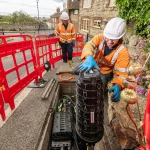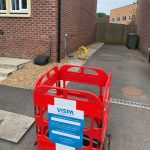Gigabit Broadband Voucher Scheme Expanded to UK Urban Areas

The Government’s Building Digital UK (BDUK) agency has today tweaked the language on the information page for their Gigabit Broadband Voucher Scheme (GBVS) in a number of key ways. This sees the removal of “rural” specific language and the introduction of language stating that some areas are “open for urban voucher projects“.
The GBVS usually offers grants worth up to £4,500 to help rural premises (homes and businesses) get a gigabit-capable broadband (1Gbps) ISP service installed, which is available to areas with speeds of “less than 100Mbps” – assuming there are also no near-term plans for a gigabit deployment in the same area (either via private investment or state-aid). Until now, this has been almost exclusively focused upon helping poorly served rural areas.
However, ISPreview has previously reported that BDUK were also exploring the possibility of expanding the GBVS to cater for poorly served parts of urban areas too (here), which may otherwise sit neglected as patches of poor service, typically dotted about like small islands inside major cities and towns.
Advertisement
The latter problem can be caused by all sorts of challenges (e.g. high build costs, issues with securing wayleave / access and permits or road closures etc.), while state aid and competition laws often make it very difficult to use direct public funding in such areas (i.e. locations where private investment should be able to resolve without intervention).
The easiest solution to the aforementioned legal and competition dilemma has typically been to use a voucher scheme, which was tried before (‘Connection Vouchers’) and eventually morphed into today’s more rural-focused scheme. But not everybody is a fan of expanding vouchers to urban areas and some opposition MPs have criticised the idea, which is despite it first being proposed under the previous government (here).
What’s changed today?
In short, the government has today updated the GBVS scheme so that it’s no longer using rural-specific language and is also open to “urban voucher projects“. At present the urban side of this is only open to several regions, including Birmingham and the Black Country (suppliers: E-volve Solutions, Exascale, Openreach), Merseyside and Greater Manchester (suppliers: B4RN, Freedom Fibre, Openreach, PXC), Greater London (suppliers: Openreach, Trooli) and the following parts of Scotland – Aberdeen, Dundee, Edinburgh, Glasgow and Glenrothes (suppliers: Highland Broadband, Openreach).

According to a related supplier briefing, there is £2m available for projects to bring gigabit broadband to urban homes and business that have thus far been left excluded by commercial deployments. The eligibility criteria for all this remains largely unchanged, albeit with some tweaks for businesses and the exclusion of premises that “are not vacant/unoccupied or derelict and have not been built in the last two years.”
Advertisement
Who is eligible?
Homes and businesses must meet the following criteria to be considered for a voucher project:
- existing available broadband download speeds are less than 100Mbps
- a gigabit-capable network is unlikely to be built to the area commercially in the near future
- there is no government-funded contract planned or in place to improve the network
- the premises are not vacant/unoccupied or derelict and have not been built in the last two years
BDUK makes available to suppliers an indicative list of eligible premises in areas that are open to voucher projects. Suppliers conduct further eligibility checks and are then responsible for developing project proposals and requesting vouchers.
A project must cover at least two eligible premises, with two or more eligible residents and/or businesses using their vouchers towards the shared cost of installation. Single connections are not eligible for the scheme.
All projects are subject to BDUK commercial and value for money assessments.
New connection speeds must reach:
- at least double the existing speed if the current speed is less than 50Mbps
- at least 100Mbps if the current speed is more than 50Mbps
Business eligibility
In addition to the above, in order to qualify for a business voucher, beneficiaries will be asked to self-certify as a Small or Medium size Enterprise (SME), as defined by sections 465 to 467 of the Companies Act 2006 which can be summarised as:
- up to 249 employees and annual turnover no greater than £36 million; and/or
- an annual balance sheet total not exceeding £18 million
SME beneficiaries in designated high competition locations, defined by Ofcom as Central London and High Network Reach Areas, must also establish the following to qualify for a voucher:
The relevant organisation is no larger than a micro-sized company under sections 384A to 384B of the Companies Act 2006 which can be summarised as:
- not more than 10 employees and annual turnover no greater than £632,000; and/or
- an annual balance sheet total not exceeding £316,000
Beneficiaries will be asked to provide evidence of their status as a SME or sole trader and self-certify that the organisation will have received less than €325,000 Special Drawing Rights (SDRs) in public grants over any period of three fiscal years including the current year, including the voucher contribution.
The Special Drawing Rights amount has replaced the €200,000 de minimis grant limit following the UK’s exit from the European Union on the 31st December 2020. The SDR to GBP exchange rate can be found here.
Not-for-profit and charitable undertakings which qualify as SMEs are eligible in the same way that for-profit enterprises are.
BDUK is also known to have been seeking expressions of interest for projects to cover premises in specific urban areas in certain other regions, which is intended to support their plans for achieving nationwide gigabit broadband coverage by 2030. Further urban areas are also expected to be added to the voucher list in due course.
Overall, we think this is a positive development, although it remains to be seen whether expanding the voucher scheme in this way will be enough to overcome some of the complex challenges that building in the remaining urban pockets of poor connectivity can often present (i.e. it’s not always just a money problem). On the other hand, £2m doesn’t seem likely to go very far, so if this proves to be a successful change then the government may need to allocate more funding.
Mark is a professional technology writer, IT consultant and computer engineer from Dorset (England), he also founded ISPreview in 1999 and enjoys analysing the latest telecoms and broadband developments. Find me on X (Twitter), Mastodon, Facebook, BlueSky, Threads.net and Linkedin.
« Owner of Three UK Considers Spinning Off Global Telecommunications Biz






















































£2,000,000, at 4K per property that’s 500 properties. Let’s be generous and say maybe 1K per property as it’s urban. So that’s a stunning 2000 properties.
This is as good as the previous Government’s school refurb announcement, which at the rate trumpeted would have seen the entire schools estate refurbished over a period in excess of 400 years.
The fact urban broadband is still an issue is bonkers. My old flat near Bristol city centre is still limited to around 5Mbps despite being a ten minute walk to Temple Meads. We had to rely on 5g when we lived there. Now I live half hour out of town instead we can get 1.6Gbps via opentreach or 7Gbps via netomnia. Make it make sense!
The question is is the road your flat is in in fibre enabled and your building is not .if that is the case it’s more about your building rather than.the road
Not exactly what I’d have wanted to see for a rural fund, but at least 4500 might help in more urban areas. Given the extortionate costs BT quote, 4500 doesn’t even make a dent in rural farming areas even if neighbouring properties pool combine the funding.
GaryH
By Bt do you mean BT as a service provider or something else or do you mean openeach and it’s fibre community partnership programme
@Fastman – BT’s Fibre Community Partnership programme isn’t active at present. Well, it wasn’t at the back end of February. Email from them stated “At this moment in time, I am sorry but we aren’t progressing any new Fibre Community Partnership schemes”
Which begs the question as to why they’re listed as a provider for the GBVS in Devon. Wasted a good week+ getting that out of them.